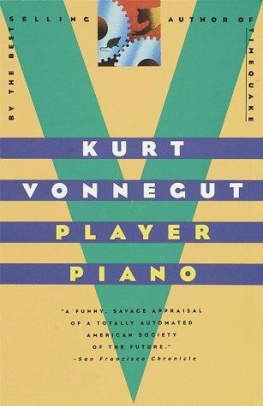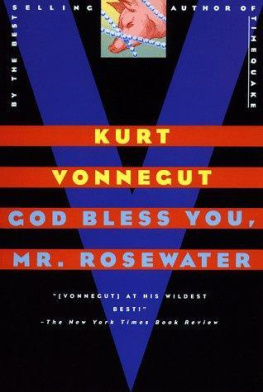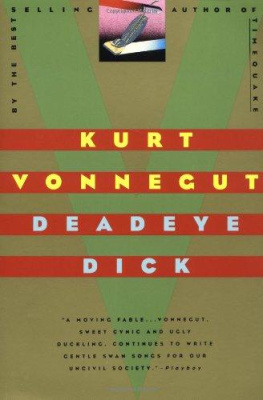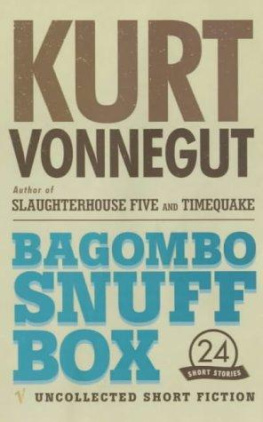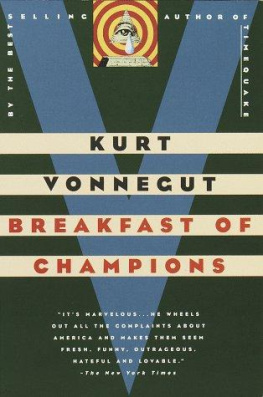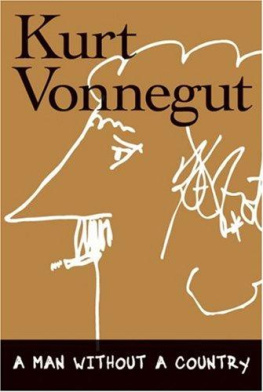Kurt Vonnegut - Player piano
Here you can read online Kurt Vonnegut - Player piano full text of the book (entire story) in english for free. Download pdf and epub, get meaning, cover and reviews about this ebook. year: 1999, publisher: Dell Publishing, genre: Detective and thriller. Description of the work, (preface) as well as reviews are available. Best literature library LitArk.com created for fans of good reading and offers a wide selection of genres:
Romance novel
Science fiction
Adventure
Detective
Science
History
Home and family
Prose
Art
Politics
Computer
Non-fiction
Religion
Business
Children
Humor
Choose a favorite category and find really read worthwhile books. Enjoy immersion in the world of imagination, feel the emotions of the characters or learn something new for yourself, make an fascinating discovery.
- Book:Player piano
- Author:
- Publisher:Dell Publishing
- Genre:
- Year:1999
- Rating:3 / 5
- Favourites:Add to favourites
- Your mark:
- 60
- 1
- 2
- 3
- 4
- 5
Player piano: summary, description and annotation
We offer to read an annotation, description, summary or preface (depends on what the author of the book "Player piano" wrote himself). If you haven't found the necessary information about the book — write in the comments, we will try to find it.
Player piano — read online for free the complete book (whole text) full work
Below is the text of the book, divided by pages. System saving the place of the last page read, allows you to conveniently read the book "Player piano" online for free, without having to search again every time where you left off. Put a bookmark, and you can go to the page where you finished reading at any time.
Font size:
Interval:
Bookmark:
KURT VONNEGUT IS
 UNIQUE one of the writers who map our landscapes for us, who give names to the places we know best. DORIS LESSING
UNIQUE one of the writers who map our landscapes for us, who give names to the places we know best. DORIS LESSINGThe New York Times Book Review A ZANY BUT MORAL MAD SCIENTIST at the controls of a literary time machine Vonnegut is George Orwell, Dr. Caligari and Flash Gordon compounded into one writer. Time A BLACK-HUMORIST, FANTASIST, AND SATIRIST, a man disposed to deep and comic reflection on the human dilemma. Life OUR FINEST BLACK-HUMORIST. We laugh in self-defense. The Atlantic Monthly AN UNIMITATIVE AND INIMITABLE SOCIAL SATIRIST. Harpers Magazine ONE OF THE FEW CONTEMPORARY WRITERS who can make you laugh despite the circumstancesor rather, because of them. The Atlanta Journal & Constitution
Breakfast of Champions
Cats Cradle
Deadeye Dick
Galapagos
God Bless You, Mr. Rosewater
Jailbird
Mother Night
Palm Sunday
Player Piano
The Sirens of Titan
Slapstick
Slaughterhouse-Five
Wampeters, Foma & Granfalloons
Welcome to the Monkey House

For Jane God Bless Her
They toil not, neither do they spin;
And yet I say unto you,
That even Solomon in all his glory
Was not arrayed like one of these. MATTHEW 6:28
This book is not a book about what is, but a book about what could be. The characters are modeled after persons as yet unborn, or, perhaps, at this writing, infants. It is mostly about managers and engineers. At this point in history, 1952 A.D., our lives and freedom depend largely upon the skill and imagination and courage of our managers and engineers, and I hope that God will help them to help us all stay alive and free. But this book is about another point in history, when there is no more war, and

I LIUM , N EW Y ORK , is divided into three parts.
In the northwest are the managers and engineers and civil servants and a few professional people; in the northeast are the machines; and in the south, across the Iroquois River, is the area known locally as Homestead, where almost all of the people live.
If the bridge across the Iroquois were dynamited, few daily routines would be disturbed. Not many people on either side have reasons other than curiosity for crossing.
During the war, in hundreds of Iliums over America, managers and engineers learned to get along without their men and women, who went to fight. It was the miracle that won the warproduction with almost no manpower. In the patois of the north side of the river, it was the know-how that won the war. Democracy owed its life to know-how.
Ten years after the warafter the men and women had come home, after the riots had been put down, after thousands had been jailed under the antisabotage lawsDoctor Paul Proteus was petting a cat in his office. He was the most important, brilliant person in Ilium, the manager of the Ilium Works, though only thirty-five. He was tall, thin, nervous, and dark, with the gentle good looks of his long face distorted by dark-rimmed glasses.
He didnt feel important or brilliant at the moment, nor had he for some time. His principle concern just then was that the black cat be contented in its new surroundings.
Those old enough to remember and too old to compete said affectionately that Doctor Proteus looked just as his father had as a young manand it was generally understood, resentfully in some quarters, that Paul would someday rise almost as high in the organization as his father had. His father, Doctor George Proteus, was at the time of his death the nations first National Industrial, Commercial, Communications, Foodstuffs, and Resources Director, a position approached in importance only by the presidency of the United States.
As for the Proteus genes chances of being passed down to yet another generation, there were practically none. Pauls wife, Anita, his secretary during the war, was barren. Ironically as anyone would please, he had married her after she had declared that she was certainly pregnant, following an abandoned office celebration of victory.
Like that, kitty? With solicitousness and vicarious pleasure, young Proteus ran a roll of blueprints along the cats arched back. Mmmmm-aaaaahgood, eh? He had spotted her that morning, near the golf course, and had picked her up as a mouser for the plant. Only the night before, a mouse had gnawed through the insulation on a control wire and put buildings 17, 19, and 21 temporarily out of commission.
Paul turned on his intercom set. Katharine?
Yes, Doctor Proteus?
Katharine, whens my speech going to be typed?
Im doing it now, sir. Ten, fifteen minutes, I promise.
Doctor Katharine Finch was his secretary, and the only woman in the Ilium Works. Actually, she was more a symbol of rank than a real help, although she was useful as a stand-in when Paul was ill or took a notion to leave work early. Only the brassplant managers and biggerhad secretaries. During the war, the managers and engineers had found that the bulk of secretarial work could be doneas could most lower-echelon jobsmore quickly and efficiently and cheaply by machines. Anita was about to be dismissed when Paul had married her. Now, for instance, Katharine was being annoyingly unmachine-like, dawdling over Pauls speech, and talking to her presumed lover, Doctor Bud Calhoun, at the same time.
Bud, who was manager of the petroleum terminal in Ilium, worked only when shipments came or went by barge or pipeline, and he spent most of his time between these crisesas nowfilling Katharines ears with the euphoria of his Georgia sweet talk.
Paul took the cat in his arms and carried her to the enormous floor-to-ceiling window that comprised one wall. Lots and lots of mice out there, kitty, he said.
He was showing the cat an old battlefield at peace. Here, in the basin of the river bend, the Mohawks had overpowered the Algonquins, the Dutch the Mohawks, the British the Dutch, the Americans the British. Now, over bones and rotten palings and cannon balls and arrowheads, there lay a triangle of steel and masonry buildings, a half-mile on each sidethe Illium Works. Where men had once howled and hacked at one another, and fought nip-and-tuck with nature as well, the machines hummed and whirred and clicked, and made parts for baby carriages and bottle caps, motorcycles and refrigerators, television sets and tricyclesthe fruits of peace.
Paul raised his eyes above the rooftops of the great triangle to the glare of the sun on the Iroquois River, and beyondto Homestead, where many of the pioneer names still lived: van Zandt, Cooper, Cortland, Stokes
Doctor Proteus? It was Katharine again.
Yes, Katharine.
Its on again.
Three in Building 58?
Yessirthe lights on again.
All rightcall Doctor Shepherd and find out what hes doing about it.
Hes sick today. Remember?
Then its up to me, I guess. He put on his coat, sighed with ennui, picked up the cat, and walked into Katharines office. Dont get up, dont get up, he said to Bud, who was stretched out on a couch.
Who was gonna get up? said Bud.
Three walls of the room were solid with meters from baseboard to molding, unbroken save for the doors leading into the outer hall and into Pauls office. The fourth wall, as in Pauls office, was a single pane of glass. The meters were identical, the size of cigarette packages, and stacked like masonry, each labeled with a bright brass plate. Each was connected to a group of machines somewhere in the Works. A glowing red jewel called attention to the seventh meter from the bottom, fifth row to the left, on the east wall.
Font size:
Interval:
Bookmark:
Similar books «Player piano»
Look at similar books to Player piano. We have selected literature similar in name and meaning in the hope of providing readers with more options to find new, interesting, not yet read works.
Discussion, reviews of the book Player piano and just readers' own opinions. Leave your comments, write what you think about the work, its meaning or the main characters. Specify what exactly you liked and what you didn't like, and why you think so.

